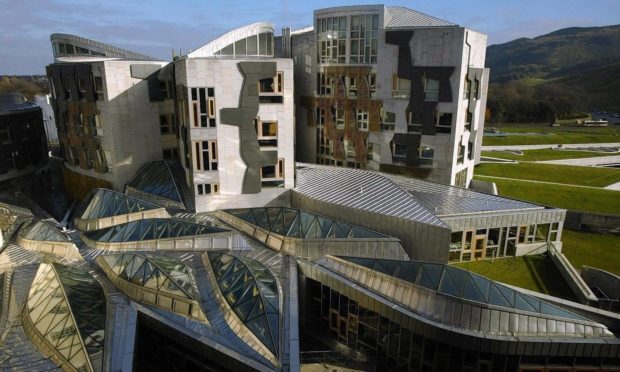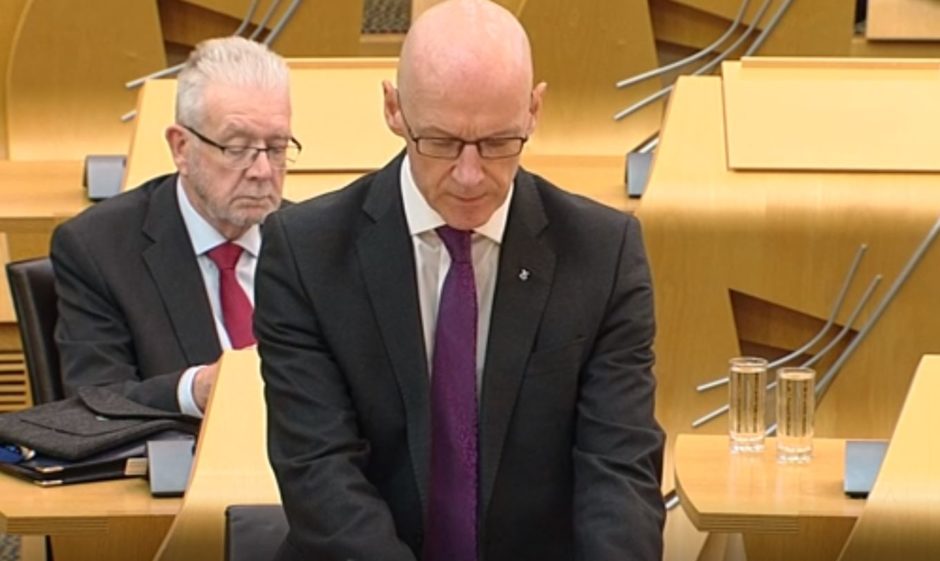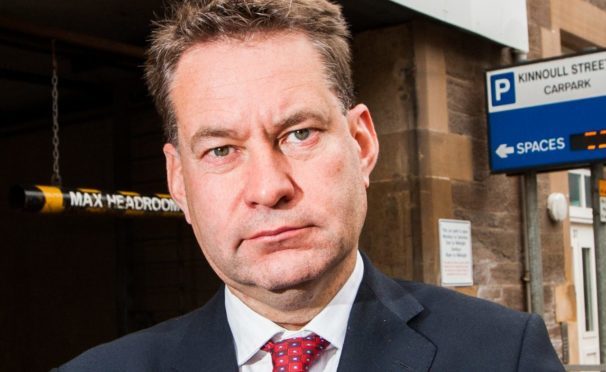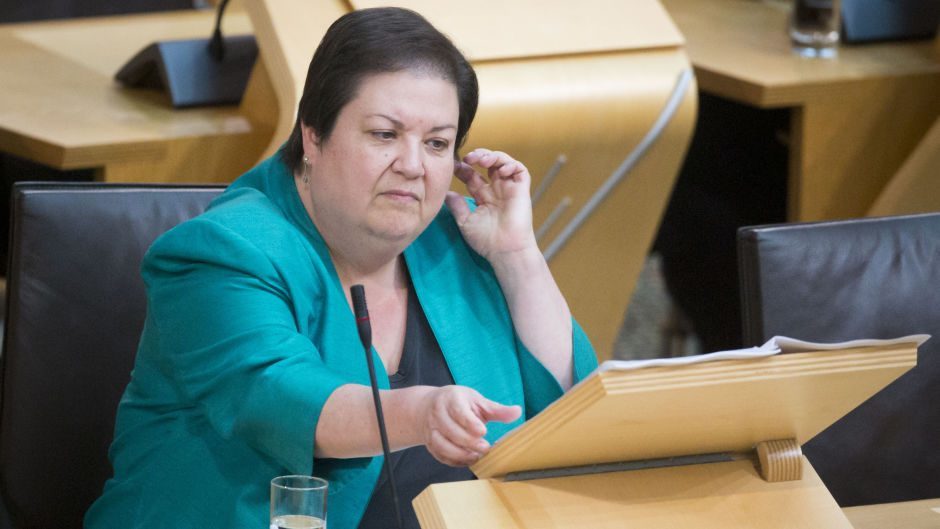Nicola Sturgeon’s government suffered a humiliating defeat when Holyrood backed calls for it to publish the legal advice it received before the collapse of its civil case against Alex Salmond.
A majority of MSPs backed a Scottish Conservative motion urging the Scottish Government to stop withholding the advice it received before Mr Salmond’s victory in the judicial review that cost the taxpayer more than £500,000.
MSPs from the Tories, Labour, Lib Dems and Greens united to declare that the will of the Scottish Parliament is for the advice to be made public.
The Scottish Conservatives argued publication of the advice is crucial if the Salmond inquiry is to determine whether claims the Scottish Government pursued a “vendetta” against the former first minister are true.
We don’t know if £500,000 of public money was handed to Alex Salmond because of sheer incompetence, faulty legal advice or something more reckless and sinister. Until the government releases the legal advice, it is impossible for the committee and the public to know the truth.”
Tory MSP Murdo Fraser
Although the vote is non-binding, in that it is not legally enforceable, Deputy First Minister John Swinney said ministers sought to respect Holyrood decisions.
Mr Swinney said the “implications” of the vote would be discussed with ministerial colleagues and the parliament would be advised of the outcomes of the talks.
Sixty-three cross-party votes for a Tory motion calling for the information to be published was enough to defeat 54 SNP MSPs who backed Mr Swinney’s amendment defending the government’s decision.
The four SNP MSPs sitting on the cross-party Holyrood committee, which has become known as the Salmond inquiry, abstained, as did the veteran SNP MSP Alex Neil, who has called for a judge-led inquiry into the handling of harassment claims made against Mr Salmond.
‘Legal privilege’ convention
The Holyrood Salmond inquiry, set up in the wake of Mr Salmond’s successful civil court case, has demanded sight of the legal advice.
But its plea has been rejected by the Scottish Government on the grounds of “legal privilege”, the long-standing convention that administrations do not make such information public.
The committee overseeing the Salmond inquiry was established to examine the botched Scottish Government investigation into the accusations made made against the former first minister.
It was flaws in the government’s internal inquiry into Mr Salmond’s behaviour that resulted in the former SNP leader winning his civil court battle and receiving more than £500,000 for his legal costs.
Claims of a ‘vendetta’ by Salmond’s allies
Leading the debate for the Tories, committee member Murdo Fraser argued the legal advice was central to the inquiry, currently being carried out by MSPs.
If the advice suggested the Scottish Government had a good case to defend, Mr Fraser said lessons would have to learned as to why such “poor” guidance was offered.
More worrying still is the accusation that this decision was made on political grounds and, in effect, the Scottish Government were pursuing a vendetta against the former First Minister, and using public funds to do so.”
Murdo Fraser
The alternative explanation for withholding the information was “much more sinister”, according to Mr Fraser.
Mr Fraser said Mr Salmond’s supporters believed the legal advice suggested the judicial review should not be defended because there was little chance of success, fuelling claims of a Scottish Government “vendetta” against the former first minister.
“Mr Salmond’s allies believe that the legal advice obtained by the Scottish Government told them that the judicial review case should not be defended, as there was very little chance of success,” Mr Fraser said.
“If that is indeed what the legal advice said, then a decision was taken at the top of the Scottish Government to go and defend the case regardless – a decision which, in the light of what we now know, was both irresponsible and reckless.
“More worrying still is the accusation that this decision was made on political grounds and, in effect, the Scottish Government were pursuing a vendetta against the former First Minister, and using public funds to do so.”
Mr Fraser added that the claim “may be nonsense” but it was impossible for the MSPs on the Salmond inquiry committee to reach a view on the two possible explanations without sight of the legal advice.
After his motion calling on the Scottish Government “to publish all the legal advice it received regarding the judicial review into the investigation of the alleged behaviour of the former First Minister, Alex Salmond” was passed, Mr Fraser said: “We don’t know if £500,000 of public money was handed to Alex Salmond because of sheer incompetence, faulty legal advice or something more reckless and sinister.
“Until the government releases the legal advice, it is impossible for the committee and the public to know the truth.
“It is surely a matter of legitimate and overwhelming public interest to understand the catastrophic failure that collapsed this judicial review, humiliated the Scottish Government and cost the taxpayer so dearly.
“Nicola Sturgeon promised to “co-operate fully” with the inquiry. If her words mean anything and if she respects the will of Parliament at all, the government must publish the advice.”
Labour’s Jackie Baillie, who also sits on the inquiry, said: “It is time for the Scottish Government to end the secrecy. Give the committee the legal advice or tell the people of Scotland what it is that you have to hide.”
A question about possible resignations
During the debate another Salmond inquiry member, Alex Cole-Hamilton of the Lib Dems, asked Mr Swinney if either the Lord Advocate or senior counsel “at any point threaten to resign because of the decisions this government was taking in respect of that legal advice?”
Mr Swinney replied that he would not go into the “substance of these processes”.
The Scottish Government’s position
Defending the Scottish Government’s stance, Mr Swinney said Scots Law ensured that those seeking legal advice had the benefit of confidential communications with their lawyer.
Maintaining legal professional privilege has not prevented the government from providing the committee with over 1,000 pages of relevant material. The Scottish Government witnesses have provided over 14 hours of oral evidence to date.”
John Swinney
“In the same way legal professional privilege is part of the normal operation of the Scottish Government, it supports good government by allowing ministers and officials to be informed by appropriate legal input when making decisions,” Mr Swinney said.
“Maintaining legal professional privilege has not prevented the government from providing the committee with over 1,000 pages of relevant material. The Scottish Government witnesses have provided over 14 hours of oral evidence to date.
“We are working to provide more material to the committee and are setting out our intention to initiate legal proceedings seeking to allow the release of further documents we believe the committee should receive.”
Mr Swinney added that Ms Sturgeon had provided written evidence and indicated her willingness to appear in front of the Salmond inquiry committee.




